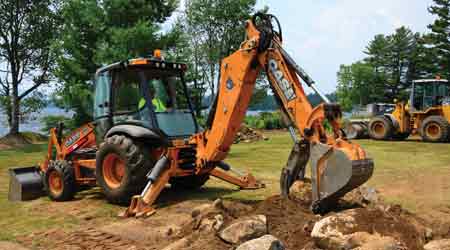 In deciding whether to buy or rent a piece of equipment, managers need to compare the cost to own the equipment over its projected live with the cost of intermittent rentals over that same period.
In deciding whether to buy or rent a piece of equipment, managers need to compare the cost to own the equipment over its projected live with the cost of intermittent rentals over that same period.Equipment Rental and Cost Considerations
Managers need to make certain they understand the needs and the limits of a particular project before deciding which piece of equipment to rent.
What could go wrong?
The cost-benefit analysis is only the first step in the decision-making process for rental equipment. It is equally important to rent the most appropriate piece of equipment for the tasks being performed. Too often, managers rent with tunnel vision. They focus on a particular piece of equipment when they have options — other pieces of equipment that might help technicians perform necessary tasks more efficiently.
Managers need to make certain they understand the needs and the limits of the particular project before deciding on a particular rental. Where will technicians use the equipment? What type of access is available to that location? If the equipment requires connections to utilities, are they available at that location?
To avoid problems, managers should not make equipment decisions in the blind. Instead, they should work with project managers and maintenance technicians to identify needs, then match the equipment choice to those needs. For example, a portable cooling system that is too large or too small for the space either will be ineffective or inefficient. Similarly, a piece of excavation equipment that is not up to the task or is too large to control in a confined space will waste time and money.
Poor timing is another common rental mistake. In order to meet the needs of the project while minimizing rental costs, managers must have the most appropriate equipment available to technicians at the right time and only for the time when they actually need it. Rarely do workers need a piece of equipment on site over the entire duration of the project, particularly if the equipment only performs a limited number of tasks.
Good timing requires good scheduling. Managers need to identify not only the equipment needed for a particular project, as well as when technicians will need it. They can lay out a project schedule that includes a projected timeline for when crews will need rental equipment. Project schedules shift, but managers can set up rental contracts ahead of time and work with the rental company to set the exact timeline for the rental period.
Focusing only on the initial cost of the rental is the equivalent of wearing blinders. Cost is an important factor, but it is not the only one. Does the rental cost include delivery, setup, and pickup? All three can be significant costs that might not be included in the basic rental cost.
What about training? Maintenance technicians might not be familiar with the rental equipment and, as a result, might require training. Depending on the equipment, that training might require significant time for both operators and the rental company. Is this requirement included in the contract, or is it an additional cost? Training must go beyond the controls. Operators also must understand how to set up and operate the equipment and how to do so safely.
Operator’s manuals contain a wealth of information on using the equipment properly and safely. Technicians must read them completely before beginning operations. If the manual is not available, managers need to make certain the rental company’s training includes the equivalent.
Managers also must consider the possibility that a piece of equipment might break down. Is the rental company responsible for picking up the defective equipment and delivering a replacement unit, or is that the responsibility of the renter? What kind of response time does the rental company offer for replacing failed equipment? Is it guaranteed? Does the company have replacement equipment available, or does it have to find one? Equipment breakdowns — particularly if a replacement unit is not readily available — can destroy project schedules.
Failure to read the entire rental contract before signing is one of the biggest mistakes that managers can make. Contracts can be pages long and filled with legalese, making them difficult to understand and downright boring. Managers typically sign them at equipment pick up or delivery, when everyone is in a hurry to get started. If managers pay attention to any of the contract terms, it is to the length and the cost.
But the rental contract binds the manager to the terms of the rental. Buried in its fine print are the details on items such as delivery, return, maintenance requirements, damage liability, training and late charges. Not understanding these items before signing can greatly alter the total rental cost and impact the timing of the project.
Spotlight on planning
The key to a successful equipment rental experience is planning. Except in the case of emergencies, managers know about most project requirements well ahead of time. During project planning, managers should perform similar planning for required equipment rental, including the equipment needed and the phase of the project. Managers then can research which companies have the equipment in their inventory and are most likely to have it when it is needed.
They also should get a sample copy of a rental agreement for that piece of equipment to determine rates, all components of the rental cost, how quickly equipment can be picked up or delivered, and the cost of services above the basic contract. With that information, they can make comparisons among different rental companies, and they can identify multiple rental sources if the equipment is not available from the preferred source.
James Piper, P.E., is a national consultant with more than 30 years of experience in facilities maintenance, engineering and management issues.
Related Topics:














